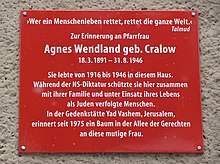Agnes Wendland
Agnes Wendland , b. Cralow (born March 18, 1891 in Wittenberge , † August 31, 1946 in Senzke ) was a resistance fighter against the Nazi regime and pastor's wife of the evangelical Gethsemanegemeinde in Berlin . Risking their lives hidden and protected them during the Second World War as Jews persecuted people in the rectory of the church.
Life
She was the wife of the Protestant pastor Dr. Walter Wendland, who took up the parish of the Gethsemanegemeinde in Berlin in 1916 and at the same time worked as a lecturer in church history at the Friedrich-Wilhelms-Universität Berlin ; her brother-in-law was the Basel university professor Johannes Wendland . She and her husband had two daughters and a son. During the time of National Socialism , she and her daughter Ruth Wendland joined the Protestant opposition movement Confessing Church , which resisted attempts by the Nazi regime to bring the teaching and organization of the German Evangelical Church into line.
In August 1943 she hid the young Jewish boy Ralph Neumann and employed his sister Rita as a housekeeper. Both lived underground because of the persecution by the National Socialists . Agnes Wendland hid the true identity and origin of the two young people from her husband in order to protect him in his position as pastor of a large Protestant church community.
Ralph Neumann described Agnes Wendland in his memoirs as a woman with admirable serenity and joie de vivre, who acted lovingly, caringly and selflessly.
Thanks to the support of the courageous university teacher and historian Elisabeth Abegg , Rita Neumann managed to acquire a new identity in the summer of 1944. With a fictitious name, she stated that she came from a city in which the town hall with the population register had been destroyed in a bomb attack. As a supposedly “ Aryan ” German citizen, she received a new identity card, food cards and a job.
In November 1944 Walter Wendland suffered a stroke and moved to live with his daughter Angelika in Senzke , whereupon Agnes Wendland continued to run the parish.
In February 1945, Ralph Neumann was arrested during a check by a military patrol in Lehrter Bahnhof . Together with Rita Neumann, who gave up her false identity, Agnes Wendland actively campaigned for the Gestapo to have Ralph Neumann released. Thereupon Agnes Wendland was arrested and taken prisoner from February 20 to March 14, 1945 in the Gestapo labor education camp on Grosse Hamburger Strasse in Berlin-Mitte . After she contracted typhus there , she was exchanged for her daughter Ruth, who had offered to be exchanged for her sick mother. Agnes Wendland died in August 1946 in poor health.
Honors
On August 12, 1975, Agnes and her daughter Ruth Wendland were posthumously awarded the honorary title of Righteous Among the Nations by Yad Vashem for their courageous work in the rescue of persecuted Jews . A tree in the avenue of the righteous at the memorial there has been a reminder of both women since 1975 . This honor was inspired by the two protected Jewish siblings who were hidden and protected in the rectory, who survived the Holocaust through the selfless efforts of the Wendland family and other courageous helpers.
On 31 August 2006, the Gethsemane Community of Berlin was a plaque as in the Gethsemanestraße 9 at the rectory Denkzeichen appropriate for Agnes Wendland.
literature
- Israel Gutman with the collaboration of Sara Bender (Ed.): Lexicon of the Righteous Among the Nations. Germans and Austrians. Wallstein Verlag, ISBN 978-3-89244-900-3 .
- Ralph Neuman: Memories of my youth in Germany 1926–1946 . Ed .: German Resistance Memorial Center. ISBN 3-926082-23-2 .
Web links
- Memorial of the district office Pankow of Berlin
- Photo and short biography at: Ökumene im Prenzlauer Berg
- Thomas Loy: Angelika Rutenborn (born 1915). In: Der Tagesspiegel . September 8, 2011, accessed on February 5, 2012 (obituary by Angelika Rutenborn, a daughter of Agnes Wendland).
Individual evidence
- ^ Ralph Neuman: Memories of my youth in Germany 1926–1946 . Ed .: German Resistance Memorial Center. ISBN 3-926082-23-2 .
| personal data | |
|---|---|
| SURNAME | Wendland, Agnes |
| ALTERNATIVE NAMES | Cralow, Agnes (maiden name) |
| BRIEF DESCRIPTION | Resistance fighter against the Nazi regime |
| DATE OF BIRTH | March 18, 1891 |
| PLACE OF BIRTH | Wittenberg |
| DATE OF DEATH | August 31, 1946 |
| Place of death | Senzke |

